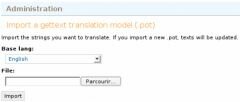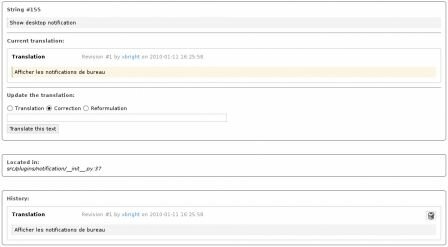It's now the time to publish the results of our survey. I want to thank you all for your participation, as we get nearly 80 answers to the "CodingTeam survey 2011".
Even so our survey suffered from a few weaknesses like the fact that a few questions not addressed to all of our users were mandatory, the result provide us a lot of useful informations. The problem with our mandatory questions (features scores) is that the scores are devalued and there were confusion in the responses.
So, let's start!
The CodingTeam software forge is a young project and it's used by young people! 57.89% of our users report being between 15 and 25 years. There are 38.16% of our users between 26 and 60 years. On the other side, there are fewer users that are more than 60 years (2.63%) or less than 15 years (1.32%). Thus, we can see that the majority of our users are young, with nearly 60 percent of them under 25.
In the beginning, CodingTeam was an attempt to provide a good forge to the French-speaking community, and we can see that 67.87% of the users are from France. Other well represented countries are Belgium (8%), Switzerland (6.67%), Brazil (2.67%), Germany (2.67%) and Slovakia (2.67%). There are also users from Australia, China, Czech republic, Ireland, Madagascar, Russia and Vietnam. Therefore, it's an international project, although we can bemoan the lack of users from United States, United Kingdom, Spain etc. Note that we know a few users from India too.
It's interesting to take a deeper look to the SCM usage question. We asked if our users were using a (distributed) version control system or not, and which one. It appears that 21.34% of the interviewed CodingTeam users don't use an SCM. Thus, we can conceive that the work we did on the HCI allows users who are not developers to use our software forge: translators, graphic artist, packagers… It may be the sign that we successfuly created the easy-to-use interface we wanted. The others 78.66% are using various systems:
- Subversion (50%)
- Git (21.43%)
- Mercurial (16.07%)
- Bazaar (5.36%)
- CVS (5.36%)
- Darcs (1.78%)
It also appears that 33.96% of users discovered the project by a friend (many thanks to them!), 28.30% by a project using it, 20.75% by a news article and 16.99% by an Internet research.
On the communication subject, we asked our users how they want to be advised of project news. Thus, 59.375% of them would accept to receive a newsletter from time to time. This may not be done because of the large 40.625% of our users that don't want at all. It's also interesting to see that only 54.69% of our users knew that the CodingTeam blog exists, the others just ignored it!
Thereby, our users give a rating of 6.52/10 on the quality of our project communication. We already know that it was one of our weakness and we will take into account the remarks made by them, like:
- the usage of the French in addition to English
- modernization of the appearance
- ATOM feed (hey, that already , just follow this blog, man!)
- interesting tutorials/links
Another user complained about the fact that the communication is too oriented toward the group of French-speaking people on the XMPP chatroom. This can explain the large majority of our users from France. We should focus other countries and languages to reveal our software forge across oceans!
It's very interesting to know that the CodingTeam software forge is mainly use on CodingTeam.net (73.69%), but it's also used elsewhere:
- users own forge (19.30%)
- forge installed for a single project (3.49%)
- companies (1.76%)
- research laboratories (1.76%)
Our users seems to be satisfied with CodingTeam! The software forge gets a global score of 7.75/10.
The translation system is rated 6.55/10 (the next release will bring a few improvements as the reduction of the loading time). The bug tracker gets a 6.88/10 (again, the next release will bring improvements like pre-selected filters). The documentation system is rated 6.50/10 (users seem to don't like CamelCase and ergonomics).
The top rated features are the SCM support (7.29/10) and the communication tools (7.13/10).
The feedbacks sent by our users are also very interesting. Most of the opinion are positive (encouragement, congratulations) and a few features requests.
It is not surprising to see that among the 39.44% of users that are using another software forge, the most used are Launchpad and Teamforge/SourceForge.net (both 18.42%), followed by Redmine and Trac (both 15.79%), Github (10.54%), InDefero and FusionForge (both 5.26%) and BitBucket, CodePlex, Google Code and Savane.
We asked for the opinion of our users on certain probable features for the future of the project. Here are the podium:
- more statistics (27.45%)
- unbelievable technology from outer-space (26.47%)
- agenda and calendar (25.51%)
- website hosting (21.57%)
A lot of work have been done on the development version of CodingTeam on the statistics. We are glad to announce that projects will soon benefit from detailled statistics! The current stastistics page will be extended with a global activity report (commits, bug tracker, forum topics, translations and documentation in a table and a graph), and a source code analysis!
We also plan to send someone in space to bring back a piece of magic Moon rock, that will give us the ability to provide a software forge for galaxies and mice!
More seriously, our users asked for a few features, like:
- ability to fork a project
- installation script (planned)
- work on the appearance
- German translation
- API to communicate with CodingTeam (take a look at this post)
- overview: late bugs, notifications
Among these features requested, some will be part of the next release:
- Git (it seems to be more popular than Justin Bieber)
- timeline by developer
- teams associated with projects
Finally, we collected a lot of useful informations on our users and how they see and use our software forge. I also started to develop what users have asked in this survey. So it was very important to take the quizz, and again, thank you all!
See you for the next release!




